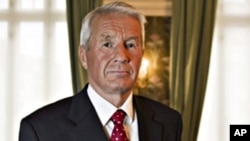Chinese dissident Liu Xiaobo has won the 2010 Nobel Peace Prize "for his long and non-violent struggle for fundamental human rights in China." The Norwegian Nobel Committee says it has long believed that there is a close connection between human rights and peace.
The Chinese dissident was rumored to be the winner, so the announcement in Oslo was not a big surprise.
"The Norwegian Nobel Committee has decided to award the Nobel Peace Prize for 2010 to Liu Xiaobo for his long and non-violent struggle for fundamental human rights in China," Thorbjoern Jagland of the Nobel Peace Prize Committee announced.
|
|
His struggle has lasted for decades. Liu was jailed after the 1989 Tiananmen Square Demonstrations and the pro-democracy activist, is currently serving an 11-year prison term imposed last year for subversion. Corinna-Barbara Francis, a China researcher for Amnesty International says winning the prize has big implications.
"We hope that this will be a message not only to the Chinese Government which it certainly is that these kind of individuals are valued by the international community, but also a message to the international community that they need to do more to protect and speak up for these kind of individuals," she said.
|
CHINESE REACTION |
|
VOA Beijing - Stephanie Ho
|
China's foreign ministry issued a statement denouncing the award saying giving it to Liu is a blasphemy to the peace prize and runs counter to its principles. It blocked TV and internet news of the prize announcement as well as text messages containing the Chinese characters of Liu's name.
Francis would like countries to stand up to China and be critical of such censorship. She says many have been reluctant to do so because of China's economic and diplomatic clout. Francis says China's standing in the world means it needs to improve its human rights record.
"China is an emerging if not an emerged global power, and with that comes responsibilities not just to its own citizens but to the international community," she said.
Tom Porteous, with Human Rights Watch says giving Liu the prize sends a far different message than last year's award, which went to U.S. President Barack Obama, less than a year into his term.
"Last year was an interesting choice, it was a controversial choice, this year is also controversial," he said. "I think in a very practical way it's going to force the Chinese government into a difficult position with regard to the internal situation within China."
Right now, Porteous says, few Chinese know of Liu and his campaign for freedom and human rights. The Nobel Peace Prize will change that he says.
"Millions of Chinese are going to be asking who is this man, why was he put in prison, what is Charter 08 which is the charter that he more or less instigated calling for greater political freedom, greater respect for human rights in China," said Porteous.
Liu joins a number of distinguished dissidents in winning the Nobel Peace Prize, including Czech former president and playwright Vaclav Havel and the late Soviet nuclear physicist and human rights activist Andrei Sakharov. Liu is the first person ever to win the prize while in jail, although other Nobel winners have been under house arrest, or imprisoned before winning the prize.
Liu is not expected to be able to travel to Oslo to collect it in person, nor is it clear whether Chinese authorities will allow his wife to travel to collect the prize.




